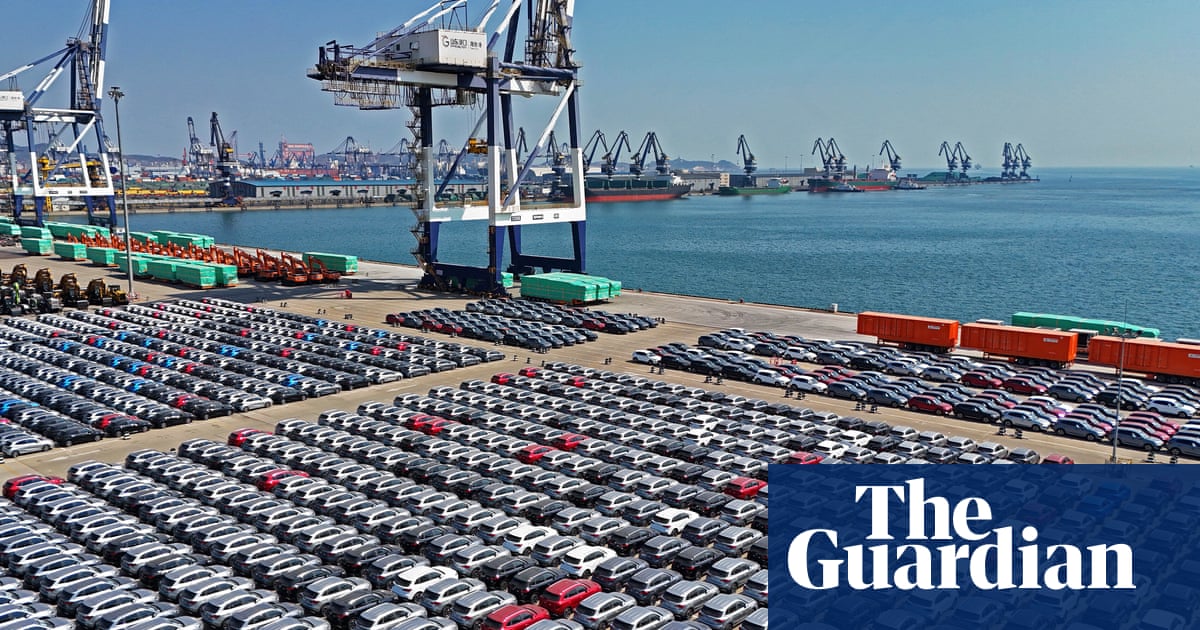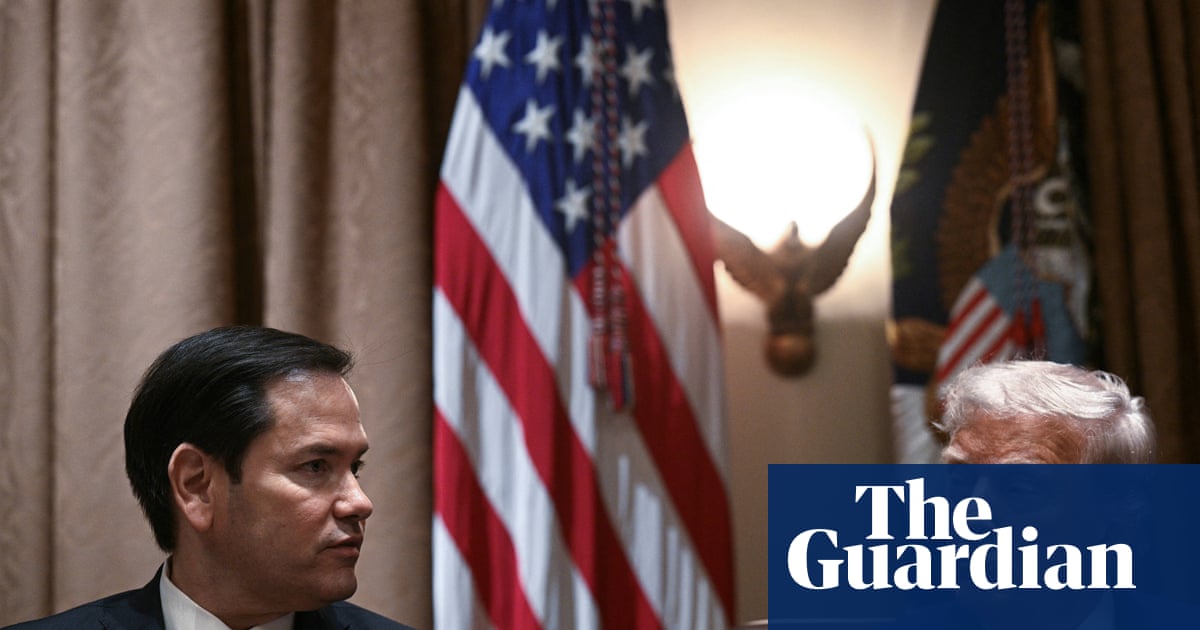'My policies will never change', says Trump as he claims China 'played it wrong' over tariffs
With the stock market in a tailspin, Donald Trump has declared that his policies will “never change” as he doubled down on his trade war a few hours after China retaliated with tariffs on US goods and claimed “this is a great time to get rich”.
The president posted on his Truth Social platform on Friday:
TO THE MANY INVESTORS COMING INTO THE UNITED STATES AND INVESTING MASSIVE AMOUNTS OF MONEY, MY POLICIES WILL NEVER CHANGE. THIS IS A GREAT TIME TO GET RICH, RICHER THAN EVER BEFORE!!!
He added:
GREAT JOB NUMBERS, FAR BETTER THAN EXPECTED. IT’S ALREADY WORKING. HANG TOUGH, WE CAN’T LOSE!!!
However, as my colleague Graeme Wearden notes, Wall Street futures continue to indicate shares will tumble when trading resumes, with S&P 500 futures down 2.7%.
Trump went on to claim China had “played it wrong” by retaliating to his escalation:
CHINA PLAYED IT WRONG, THEY PANICKED - THE ONE THING THEY CANNOT AFFORD TO DO!
Financial markets are plunging after China retaliated against the US over Trump’s tariffs with a 34% levy on US imports. It came two days after Trump imposed the same tariff on all Chinese imports, bringing the total US tariff on Chinese goods to at least 54%.
Key events Show key events only Please turn on JavaScript to use this feature
Trump TikTok sale deadline looms as US looks for deal
China’s ByteDance faces a Saturday deadline to sell the US assets of TikTok to a non-Chinese buyer, which was imposed by Donald Trump in January, or face a ban that was supposed to take effect in January under a 2024 law.
ByteDance has said it has no plans to sell the app and in court filings said that divestiture “is simply not possible: not commercially, not technologically, not legally”.

Trump said on Thursday his administration is “very close” to reaching a deal on TikTok, with multiple investors involved. A White House official said on Friday “if there is any news to be shared about the future of TikTok, President Trump will announce it at a time of his choosing.”
Trump made the comments a day after he announced a 10% baseline tariff on all imports to the US and higher duties on some of the country’s biggest trading partners, with China now facing a 54% tariff on goods imported into the country.
Here’s our Beijing correspondent Amy Hawkins’s news story on China’s retaliation to Trump’s “bullying practice” with 34% tariffs on US imports.
“For all imported goods originating from the US, an additional tariff of 34% on top of the current applicable tariff rate will be imposed,” Beijing’s finance ministry said.
China’s commerce ministry said that it would also impose more restrictions on the export of rare earths which are used in high-tech manufacturing such as batteries and electric vehicles. It added a further 16 US companies and organisations to its export control list, meaning that Chinese companies are restricted from doing business with them.
China’s state council tariff commission said:
On April 2, 2025, the US government announced the imposition of ‘reciprocal tariffs’ on Chinese goods exported to the US. This practice of the US is not in line with international trade rules, seriously undermines China’s legitimate rights and interests, and is a typical unilateral bullying practice.

Mark Sweney
From Nike to Apple: which US brands could be hit hardest by Trump tariffs and what’s at stake?
Donald Trump’s so-called “liberation day” tariff war has so far wiped trillions off the market value of publicly traded companies, with the sweeping border taxes of up to 50% poised to wreak havoc on businesses across the world.
US-based global brands from Nike to Apple have suffered some of the heaviest falls in share price and market value, as investors react to fears of price increases and a potential slowdown in consumer spending.

My colleague Mark Sweney has examined some of the most exposed industries and brands. In technology, we have Apple and Amazon.
Apple, the world’s most valuable publicly listed company, experienced a fall in market capitalisation of more than $300bn (£230bn) on Thursday in the worst single day drop since 2020 over fears the tariffs will dramatically increase its costs and fuel price increases for products such as its iPhone.
Apple makes most of its hardware in China and two other leading production hubs, India and Vietnam, were also hit with 26% and 46% tariff rates.
Other “Magnificent 7” mega-value tech companies suffered similarly. Amazon, a leading seller of imported goods from across the globe, was stripped of almost $190bn in market value. China-based sellers have more than 50% market share on Amazon’s third-party seller marketplace, according to MarketPlace Pulse.
In fashion, prices of Nike’s signature Jordan sports shoes, Levi’s jeans and Gap clothes are likely to rise in the US as Trump’s tariffs hit the Asian factory hubs that underpin the global garment industry.
The high tariffs across many leading garment manufacturing countries also threatens significant supply chain cost increases of everything from tracksuits to sweaters.
The full story is here:
Wall Street tumbles at the open after China retaliates

Graeme Wearden
The New York stock market has opened, and stocks are sliding again.
Following the worst day since March 2020, shares are being hammered again after China retaliated against the US by announcing 34% tariffs on US goods earlier today.
The S&P 500 index, a broad measure of the US stock market, fell by 2.48% at the start of trading, down 133 points to 5,262.68.
The Dow Jones industrial average, which tracks 30 large US companies, has fallen by 982 points at the open, down 2.4%, to 39,563 points.
These losses mean the Dow is down 10% from its recent record high, putting it in ‘correction territory’.
'My policies will never change', says Trump as he claims China 'played it wrong' over tariffs
With the stock market in a tailspin, Donald Trump has declared that his policies will “never change” as he doubled down on his trade war a few hours after China retaliated with tariffs on US goods and claimed “this is a great time to get rich”.
The president posted on his Truth Social platform on Friday:
TO THE MANY INVESTORS COMING INTO THE UNITED STATES AND INVESTING MASSIVE AMOUNTS OF MONEY, MY POLICIES WILL NEVER CHANGE. THIS IS A GREAT TIME TO GET RICH, RICHER THAN EVER BEFORE!!!
He added:
GREAT JOB NUMBERS, FAR BETTER THAN EXPECTED. IT’S ALREADY WORKING. HANG TOUGH, WE CAN’T LOSE!!!
However, as my colleague Graeme Wearden notes, Wall Street futures continue to indicate shares will tumble when trading resumes, with S&P 500 futures down 2.7%.
Trump went on to claim China had “played it wrong” by retaliating to his escalation:
CHINA PLAYED IT WRONG, THEY PANICKED - THE ONE THING THEY CANNOT AFFORD TO DO!
Financial markets are plunging after China retaliated against the US over Trump’s tariffs with a 34% levy on US imports. It came two days after Trump imposed the same tariff on all Chinese imports, bringing the total US tariff on Chinese goods to at least 54%.
Senate Republicans push to advance Trump's budget agenda in vote-a-rama
“Vote-a-rama” begins tonight as the Senate moves forward with up to 50 hours of debate on the new budget blueprint, culminating in a marathon voting session before a final vote as late as Saturday. The goal? To pass legislation containing much of Donald Trump’s agenda later this year, his “one, big beautiful bill”.
With lawmakers voting on budget amendments one by one, Democrats are expected to force Republicans to take politically painful amendment votes on issues that divide them throughout the series, for example on Medicaid and Trump’s tariffs.
At the end of the vote-a-rama, the Senate is expected to adopt its budget blueprint. It then heads to the House, where some conservative Republicans have already criticized the resolution.
Both chambers must adopt the identical budget blueprint before advancing legislation to implement Trump’s agenda, which includes new funding for immigration enforcement, a sweeping overhaul of the tax code, steep spending cuts and more energy drilling. The details of the legislation still need to be determined.
On Thursday, following an hourslong delay and last-minute Republican rallying, the Senate voted 52-48 along party lines to begin debate on the GOP’s budget blueprint.
Republican senator Rand Paul of Kentucky joined all Democrats in voting no and has indicated that he does not approve of including an increase to the debt limit in the resolution.
‘Markets will adjust’: Rubio shrugs off stocks falling after US tariffs

Jakub Krupa
Speaking to reporters after a Nato summit in Brussels, US state secretary Marco Rubio was asked about Trump’s tariffs, which wiped about $2.5tn off Wall Street and share prices in other financial centres across the globe.

He appeared to play down the impact, saying “their economies are not crashing – they’re markets are reacting to a dramatic change in the global order in terms of trade.”
What happens is pretty straightforward. If you’re a company and you make a bunch of your products in China, and all of a sudden, shareholders, or people that play the stock market realise that it’s going to cost a lot more to produce in China, your stock is going to go down.
But ultimately, the markets, as long as they know what this the rules are going to be moving forward … the markets will adjust.
He explained that the US has “the largest consumer market in the world, and yet the only thing we export is services, and we need to stop that”.
“We need to get back to a time where we’re a country that can make things,” he added.
“The president rightly has concluded that the current status of global trade is bad for America and good for a bunch of other people. And he’s going to reset it, and he’s absolutely right to do it,” he said.
My colleague Jakub Krupa is covering the press conference – and developments in Europe more widely – here:
'You cannot annex another country': Danish PM tells US on visit to Greenland

Miranda Bryant
The Danish prime minister has put on a show of unity with Greenlandic leaders in her first visit to the Arctic island since Donald Trump’s renewed threats to acquire the territory, telling the US: “You cannot annex another country.”
Speaking alongside Greenland’s new prime minister, Jens-Frederik Nielsen, and its outgoing prime minister, Múte B Egede, Mette Frederiksen switched from Danish to English to address the diplomatic standoff with the Trump administration. She said:
I would like to take this opportunity to send a message directly to the United States of America.
This is not only about Greenland or Denmark. This is about the world order that we have built together across the Atlantic over generations. You cannot annex another country – not even with an argument about international security.
Denmark and Greenland “want to cooperate with the United States”, she said. “If you want to be more present in Greenland, Greenland and Denmark are ready. If you want to strengthen security in the Arctic, as we would like, let’s do it together.”
Egede said Greenland wanted to cooperate with the US on trade, but reasserted his previous comments, saying: “We are not for sale.”
Meanwhile, in Brussels on Friday, Marco Rubio said Denmark should focus on the fact that Greenlanders do not want to be a part of Denmark. He told reporters at a press conference after meeting other Nato foreign ministers: “Greenlanders are going to make a decision.”
He said:
We didn’t give them that idea. They’ve been talking about that for a long time. Whenever they make that decision, they’ll make that decision.
If they make that decision, then the United States would stand ready, potentially, to step in and say, OK, we can create a partnership with you. We’re not at that stage, but that’s what the vice-president made clear last week in his visit there.
He added the US was “not going to … let China come in now and say, offer them a bunch of money and become … dependent on China”.
According to the Washington Post (paywall), the White House budget office is assessing the cost of running Greenland and working out an estimate of how much revenue could be earned from its natural resources.
Among the options on the table is to offer Greenland a higher figure in subsidies, approximately £500m a year, than Denmark currently does.
Governor Newsom to ask world leaders to exempt California's exports from retaliatory tariffs - report
The governor of California, Gavin Newsom, will announce on Friday plans to ask countries to exempt his state from retaliatory tariffs on California-made products, Fox News is reporting.

Sources have told Fox the move is a direct response to Donald Trump’s sweeping so-called “Liberation Day” tariffs, which have left global markets in turmoil and nations around the world reeling. The Golden State is the largest importer and second-largest exporter in the country. Its agricultural sector, in particular, depends on exports.
The Newsom administration is worried that California’s almond industry, a major agricultural exporter, will lose billions of dollars as nations like China, India and the EU move to impose retaliatory tariffs. Californian farmers grow an estimated 80% of the world’s almonds. Other top agricultural exports include dairy products, pistachios, wine and walnuts.
Trade with Mexico, Canada and China is also key for California, and a Newsom official told Fox the new Trump tariffs will also affect access to critical supplies, like construction materials, needed to rebuild after the Los Angeles wildfires.
The sweeping new US tariffs announced by president Donald Trump do not violate Nato treaties, the military alliance’s secretary-general Mark Rutte said on Friday after meeting Nato foreign ministers in Brussels.
Rutte was responding to a reporter’s question that referred to article 2 in the Nato treaty which states: “(Nato allies) will seek to eliminate conflict in their international economic policies and will encourage economic collaboration between any or all of them.”

 1 week ago
17
1 week ago
17













































